Viaggiare con la radio: che sia una app come Radio Garden, o una performance di percussioni e voce
Radio Garden è un'affascinante viaggio tra tutte le radio del mondo. Clicchi sul globo e ascolti la radio di quella sperduta località.
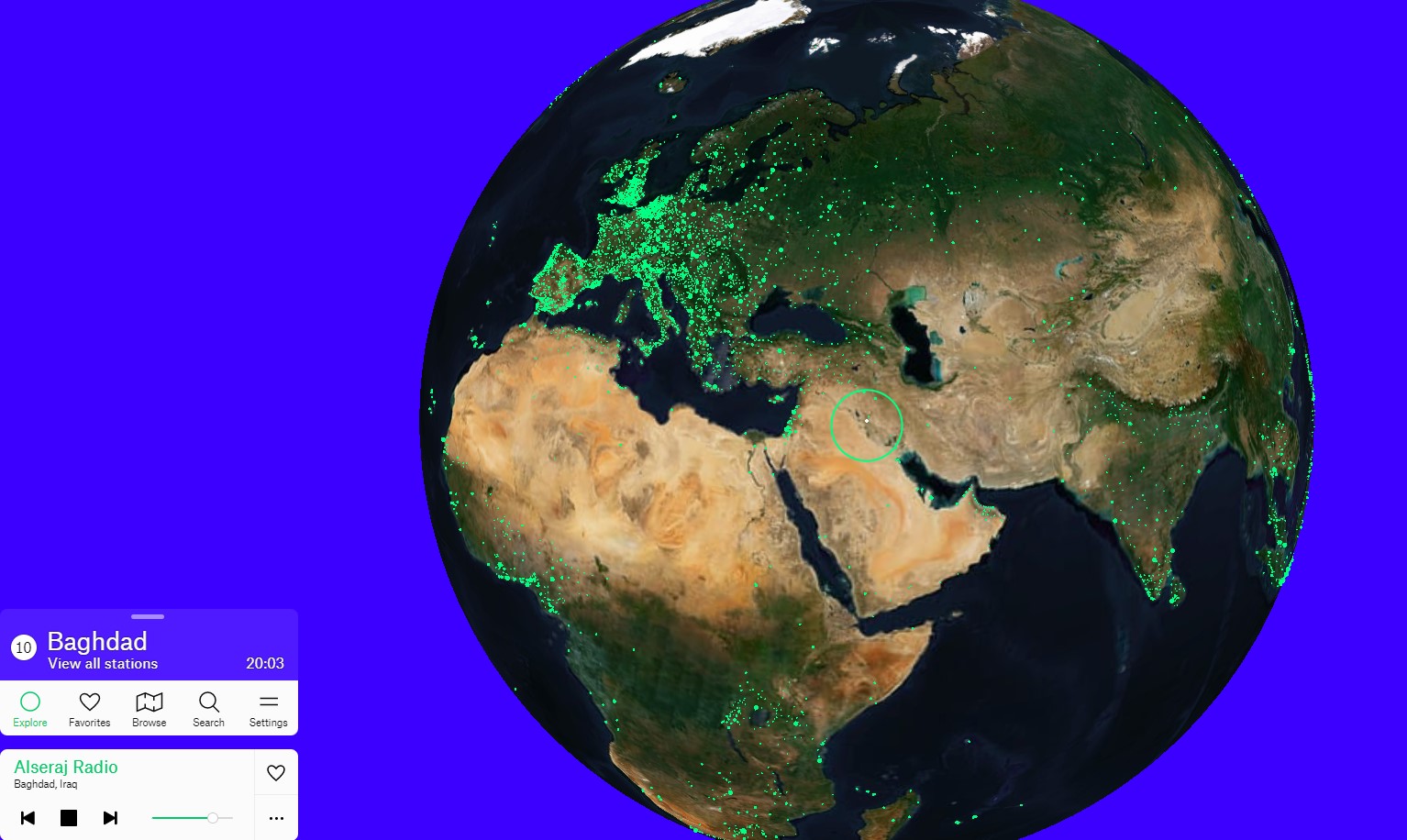
Radio Garden è un'affascinante viaggio tra tutte le radio del mondo. Clicchi sul globo e ascolti la radio di quella sperduta località.

(English translation below)
Il mio regalo per il viaggio autunnale è il consiglio di scaricarsi l’app gratuita Radio Garden (frutto del Netherlands Institute for Sound and Vision), o salvare il sito e poi muoversi liberamente sul mondo che vi appare, e che pullula di puntini verdi, ciascuno dei quali è una stazione radiofonica.
Fate tappa dove vi pare, a Barrow, nella costa settentrionale dell’Alaska, per ascoltare l’emittente KBRW, oppure Radio Mugello a Borgo San Lorenzo. A Trieste potrete scegliere tra nove stazioni locali, a Kabul solo Radio Ariana, ma c’è più musica di là dal Khyber, a Peshawar, su AM 1170.
Potete cercare e segnarvi tra le favorite le radio che trasmettono jazz o rock progressivo, o dedicate al solo Bach (una in Romania, un’altra in America). Dalla Groenlandia a Touba in Mali, da Parigi a Kampala in Uganda, non c’è angolo del mondo che si sottragga al Giardino delle Radio, che altro non è che la reincarnazione dei vecchi apparecchi che troneggiavano nelle case, con la scritta delle emittenti in corrispondenza del punto giusto del cursore, oggetti misteriosi che richiamavano voci da ogni dove.
Radio come viaggio, radio come compagnia. E proprio Radio Compagnia è un mio testo che ho ritrovato tra i miei fogli, eseguito in una performance di Jonathan Faralli, docente alla Scuola di Fiesole e già componente dei mitici Percustra (Percussions de Strasbourg), per percussioni, nastro magnetico e voce registrata, su musiche di Claudio Josè Boncompagni.
Di quella performance, eseguita al Teatro del Cestello di Firenze nel 1987, è rimasta solo la partitura, parole scritte e segni di indicazioni musicali. Creata in era ante-internet, la riporto qui, come un piccolo tappeto grafico e testuale, a mo’ di breve breviario avanguardistico delle suggestioni, dei percorsi fermi, dei pensieri in ordine sparso provocati da questo riempimento di vita che è la radio.
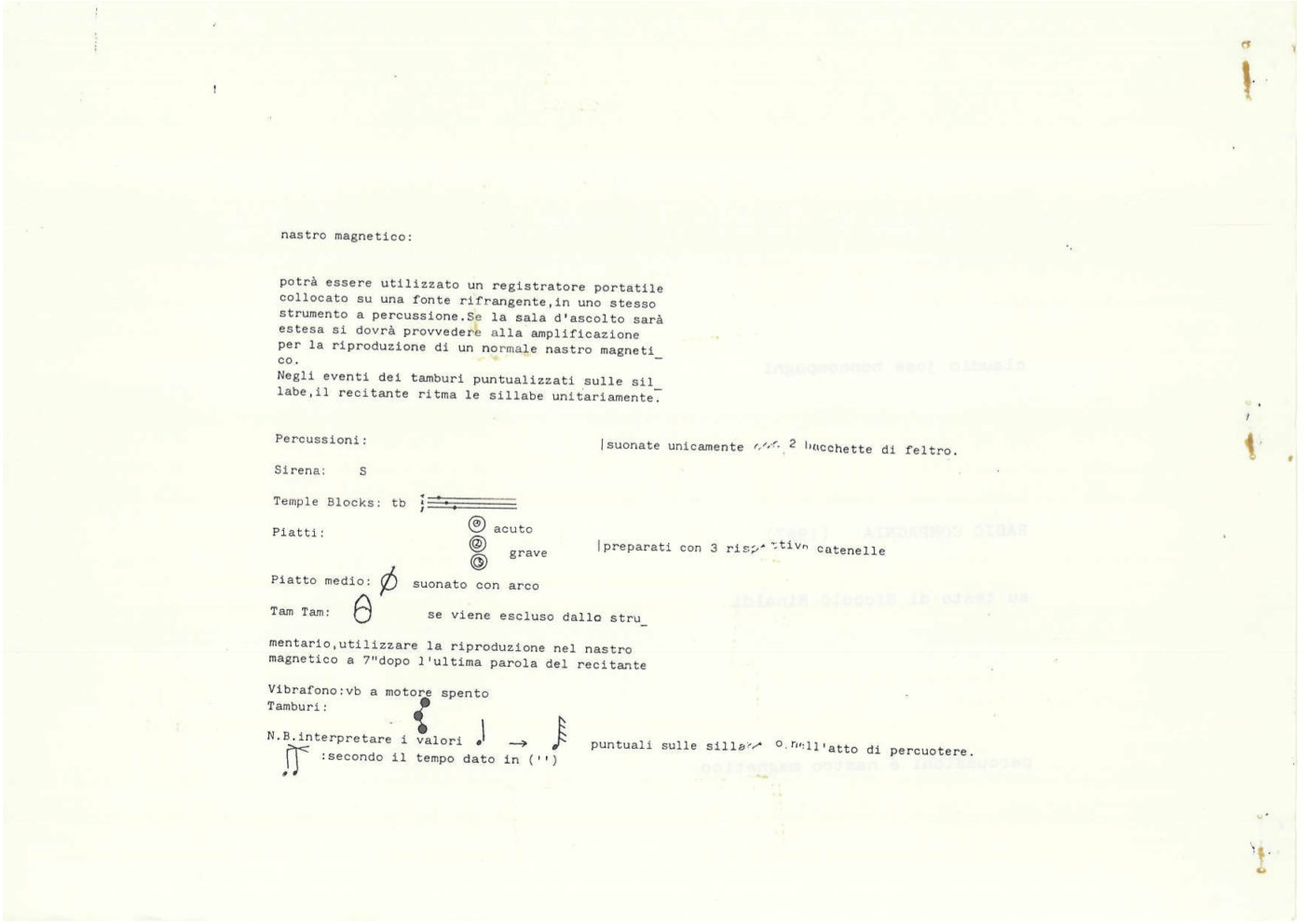
Brusio indecifrabile da lontano; stati esteri si accavallano, nomi con capitali europee, anche non. Annunciatori che non capisci, ma intuisci il senso del mondo, arriva qualcosa di potente, nell’aria, etere, atmosfera, nei cieli aperti nella notte si viaggia così, senza bisogno di luce o forse il punto di partenza è un emisfero illuminato; magari è tutto condensato nella vecchia plastica ingiallita della radio.
Condensato con addensatori e valvole a lampadina con le parole chiuse a mo’ di barattolo come il latte condensato svizzero, pure quello straniero. Questo è un altro universo: parlano, e poi le canzonette.
Basta girellare il pulsante – manovrare la manopola, pilota di una nave – un mezzo giro o un quarto dipende da dove lo si impugna, pochissimo ma con attenzione per non perdere l’ascolto di quello che sta in mezzo, e si cambia brusio.
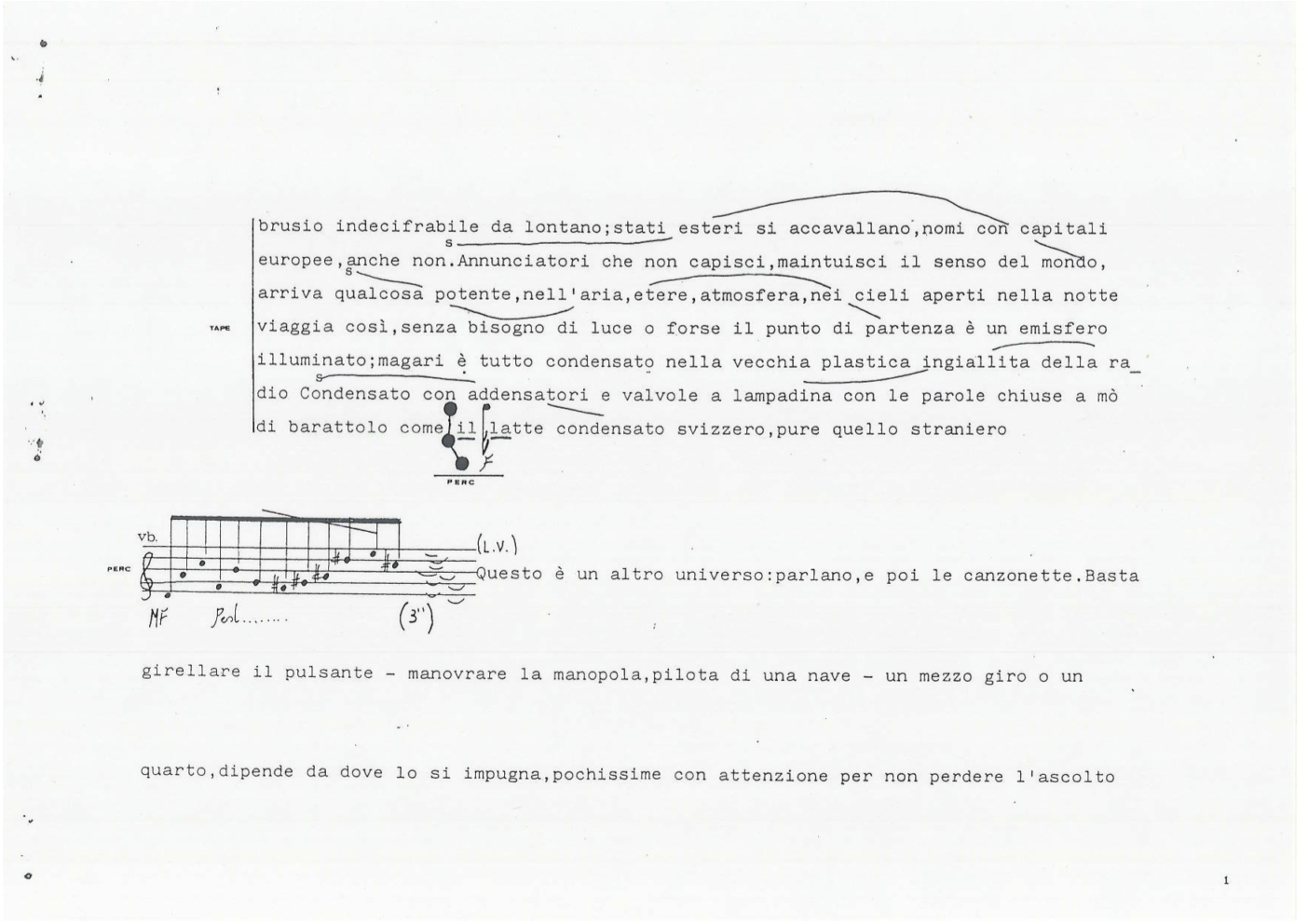
Rottura delle frequenze, ma non è doloroso. Un’altra voce e la distanza si ripete. Ancora lingue con altre strutture sintattiche. Il papà di Canan – è lei che dice così, tu babbo – tiene un apparecchio ingombrante, si infila la cuffia e da Istanbul trova la Cina, in inglese. È un appassionato, tu solo improvvisatore. Ricordi anche un ragazzo che lavorava con te alla radio libera, ti spiegava una storia di cartoline da spedire se hai ascoltato una certa stazione e quelli ti rimandano un’altra cartolina.
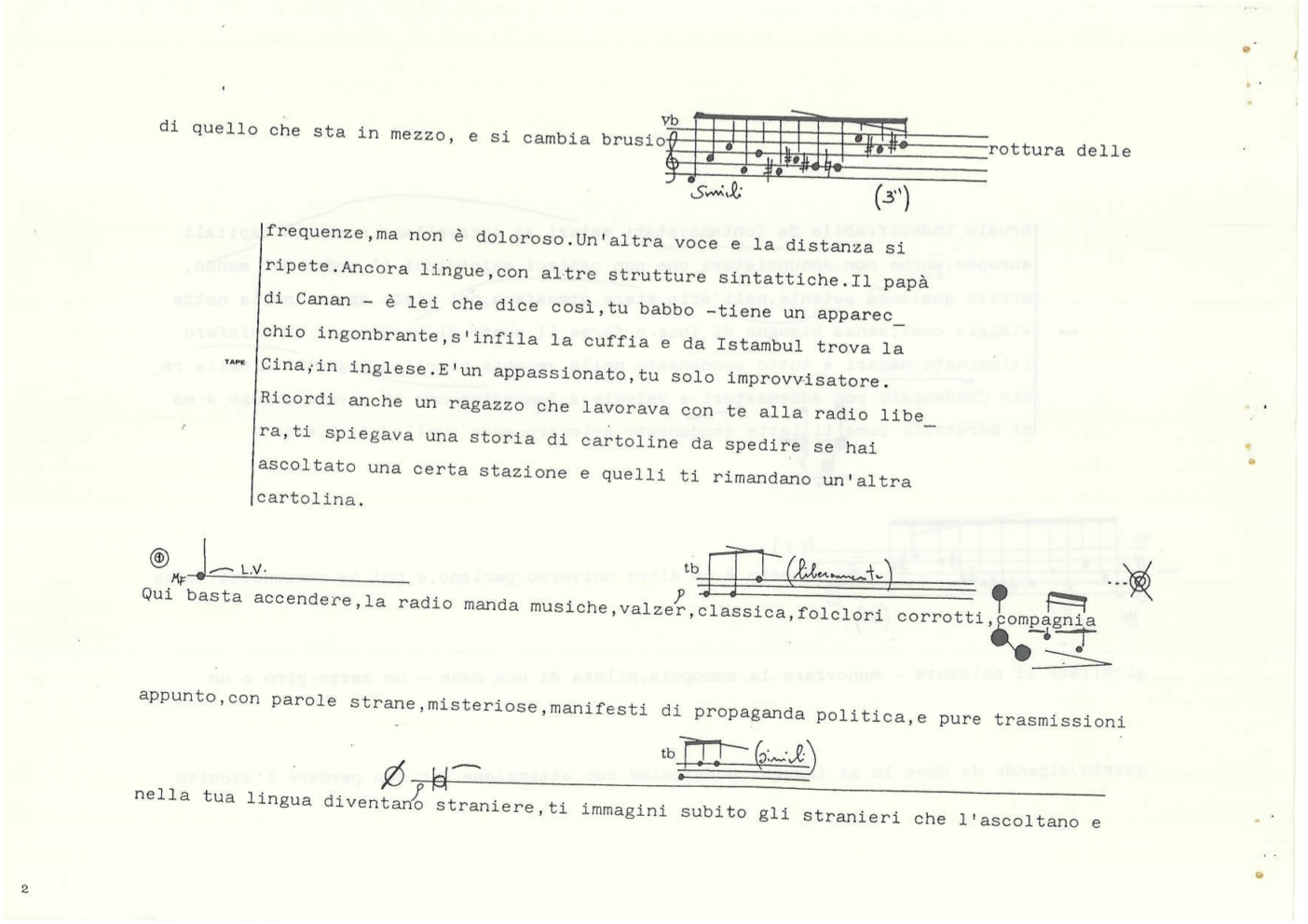
Qui basta accendere, la radio manda musiche, valzer, classica, folklore corrotti, compagnia appunto, con parole strane, misteriose, manifesti di propaganda politica, e pure trasmissioni nella tua lingua diventano straniere, ti immagini subito gli stranieri che l’ascoltano e non capiscono e ascoltando le loro stazioni si proiettano negli altri stranieri che non capiscono le loro.
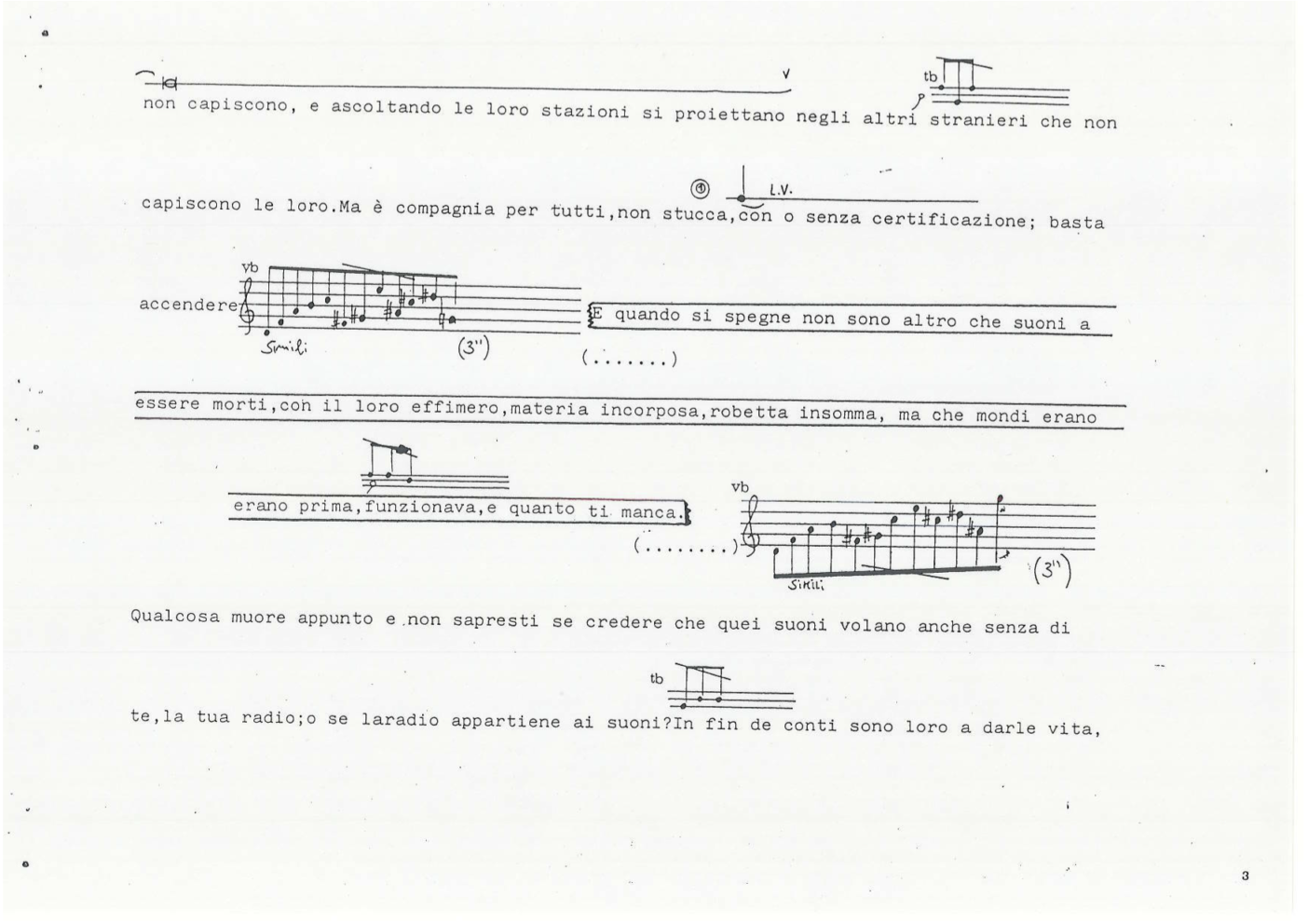
Ma è compagnia per tutti, non stucca, con o senza certificazione; basta accendere e quando si spegne non sono altro che suoni a essere morti, con il loro effimero, materia incorposa, robetta insomma, ma che mondi erano, erano prima, funzionava e quanto ti manca. Qualcosa muore appunto e non sapresti se credere che quei suoni volano anche senza di te, la tua radio; o se la radio appartiene ai suoni? In fin de’ conti sono loro a darle vita, loro a proporsi; della plastica beige tu potresti disfartene se non ci fossero i suoni, se decidessero di non comparire nella tua radio, anzi loro filiale nella tua stanza (nella tua stanza), decidono tutto loro cosa dire, eppure tu puoi un po’ scegliere; o spengere.
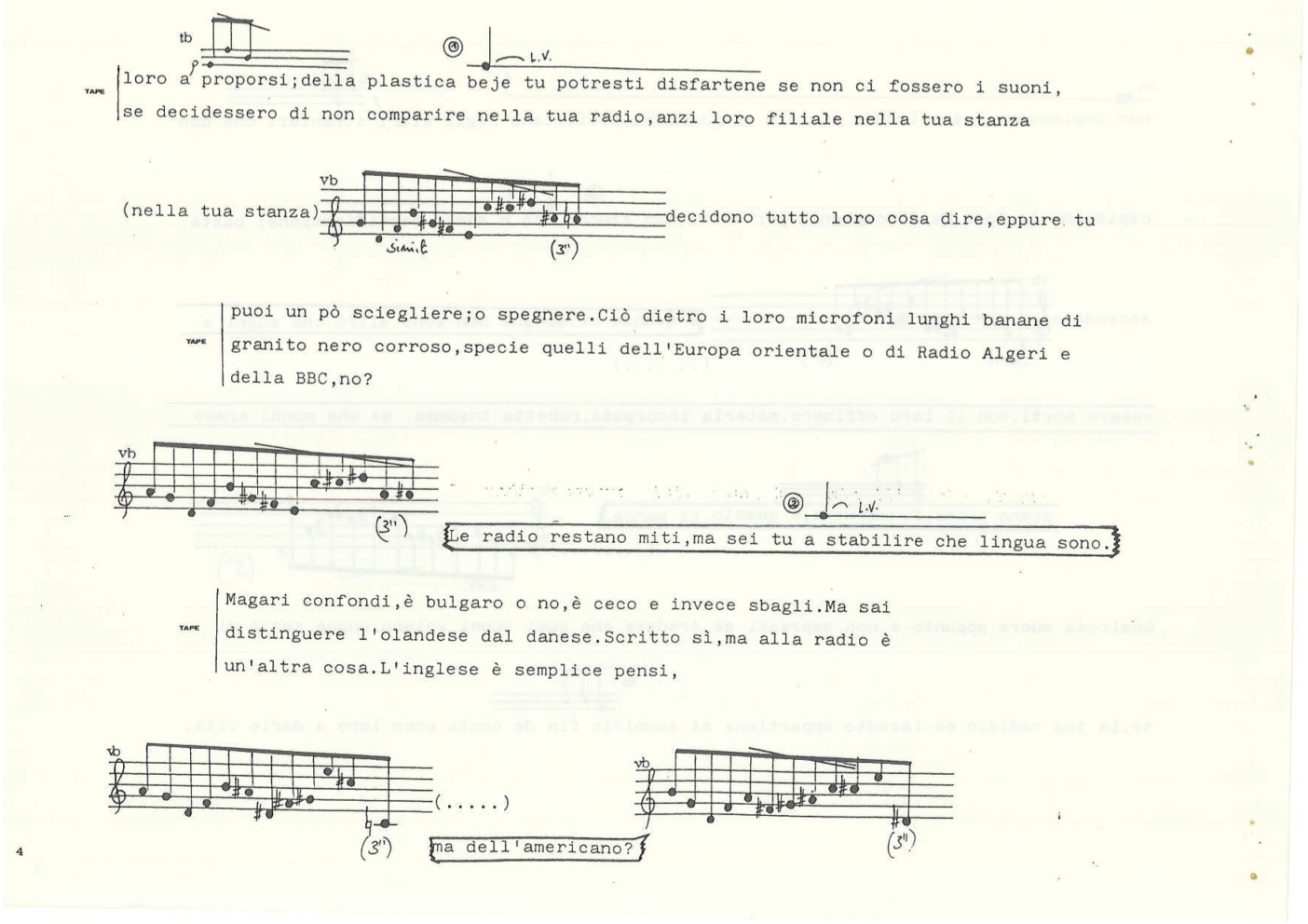
Ciò dietro i loro microfoni, lunghi banane di granito nero corroso, specie quelli dell’Europa orientale o di Radio Algeri e della BBC, no?
Magari confondi, è bulgaro o no, è ceco e invece sbagli. Ma sai distinguere l’olandese dal danese. Scritto sì, ma alla radio è un’altra cosa. L’inglese è semplice, pensi, ma dell’americano? Distingui anche il turco, pensi ce la faresti. Sebbene mai ascoltato radio Ankara, e allora non c’è tutto il mondo. Ma è l’impressione che lo sia, l’impressione forte che lo sia davvero, con voli in interrotti sulla sua circolarità.
Come le lingue chissà se sarà sempre notte là? Forse sì, forse no, ma se nella campagna, dopo la tua finestra è notte, te la figuri dappertutto. C’è una prova. I suoni arrivano solo di notte, la notte con la luce senti poco, più che altro brusii, meno voci, meno compagnia, anzi non è meno ma è diversa – con musica ovvia, non più strana – più scattante, ora stucca.
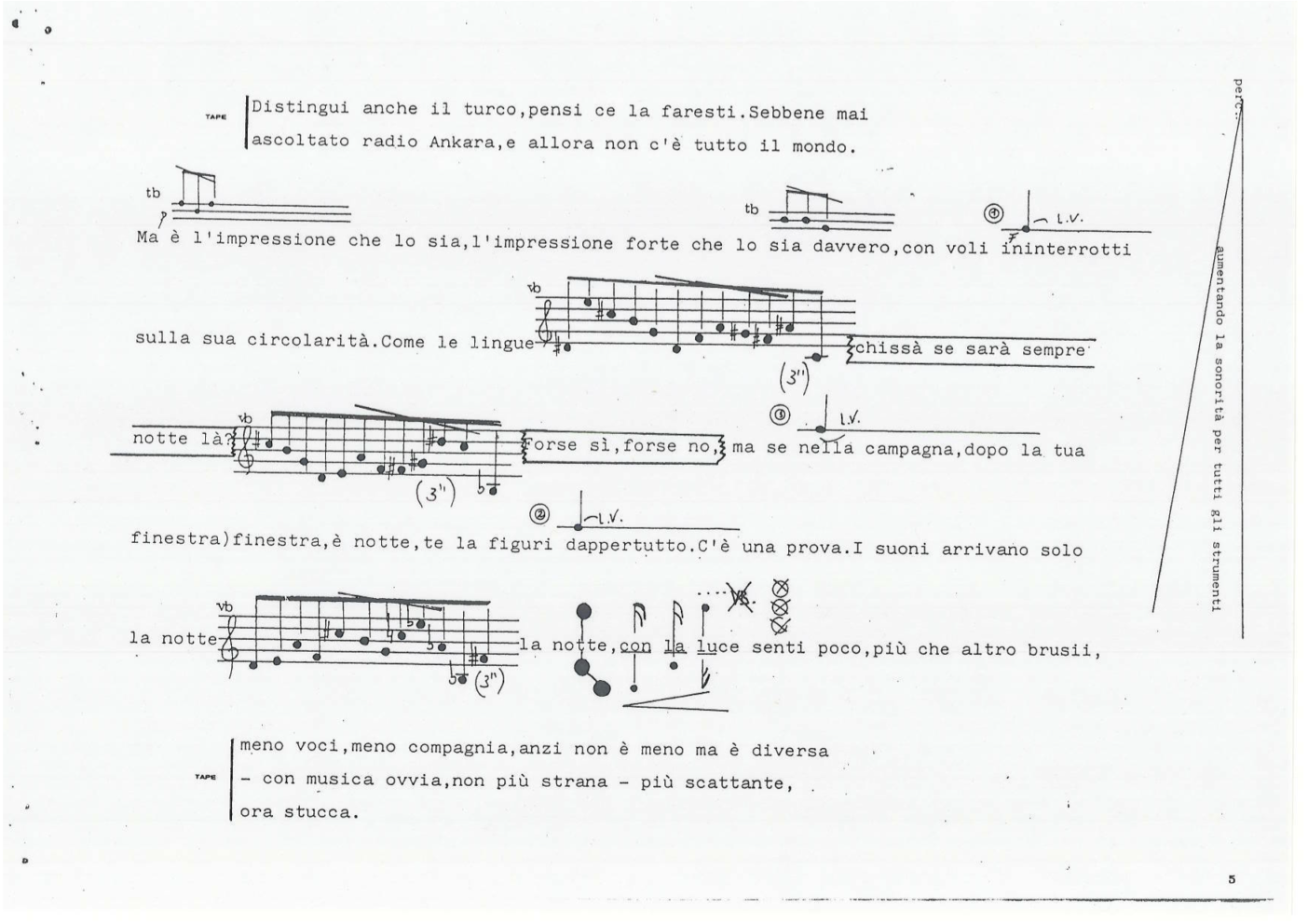
E le stazioni italiane di giorno non ti viene di prenderle per estere. Puoi trarne forse qualche conseguenza sull’effetto di straniamento sconosciuto al giorno. Se hai dubbi non chiedere, non ce n’è nemmeno bisogno: neanche io, tanto parlammo, parlano (parlano) (parlano) forse si ripetono con le musichette, le canzoncine.
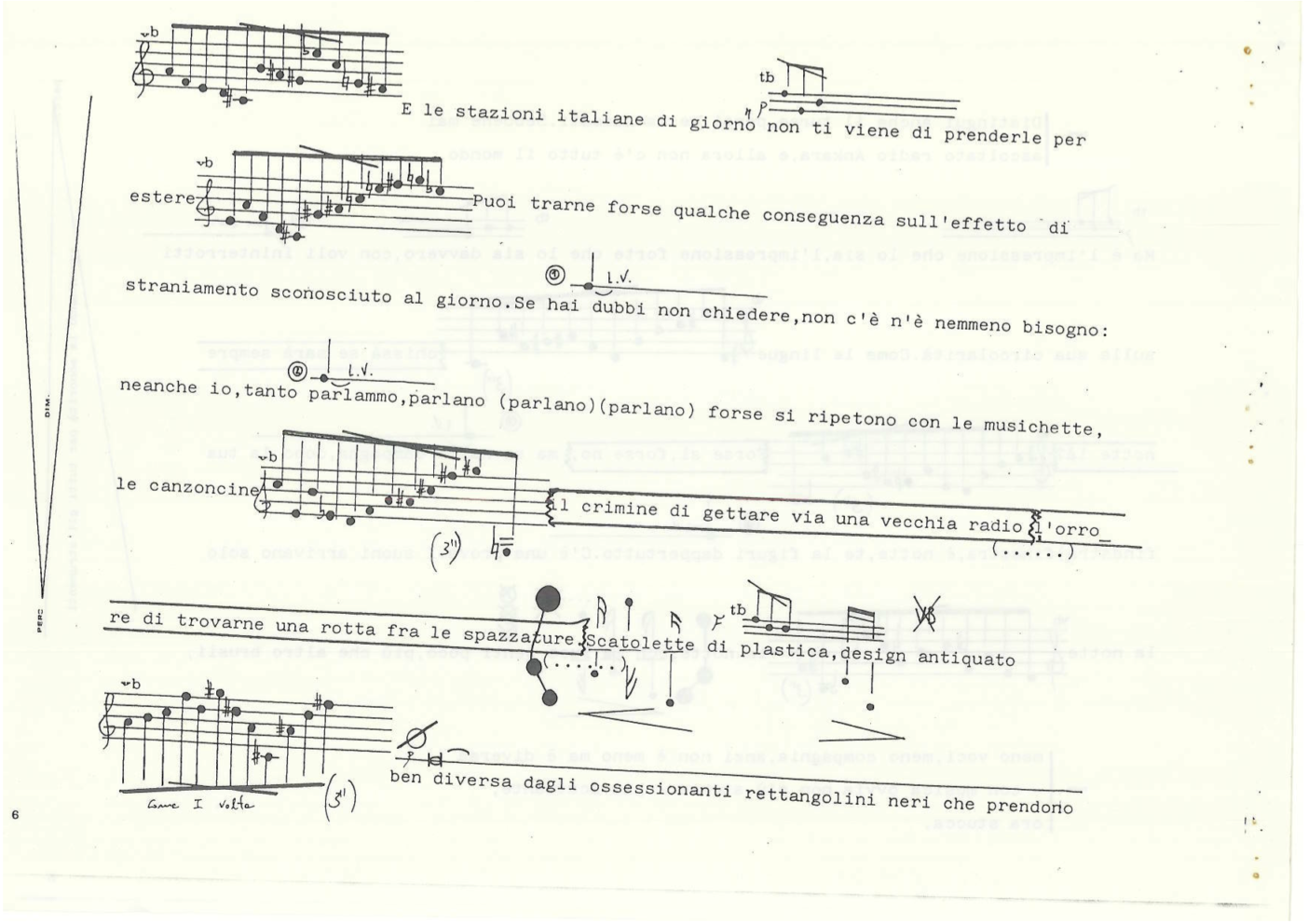
Il crimine di gettare via una vecchia radio, l’orrore di trovarne una rotta fra le spazzature. Scatolette di plastica, design antiquato, ben diversa dagli ossessionanti rettangolini neri che prendono solo le partite di calcio la domenica, anche a Boboli.
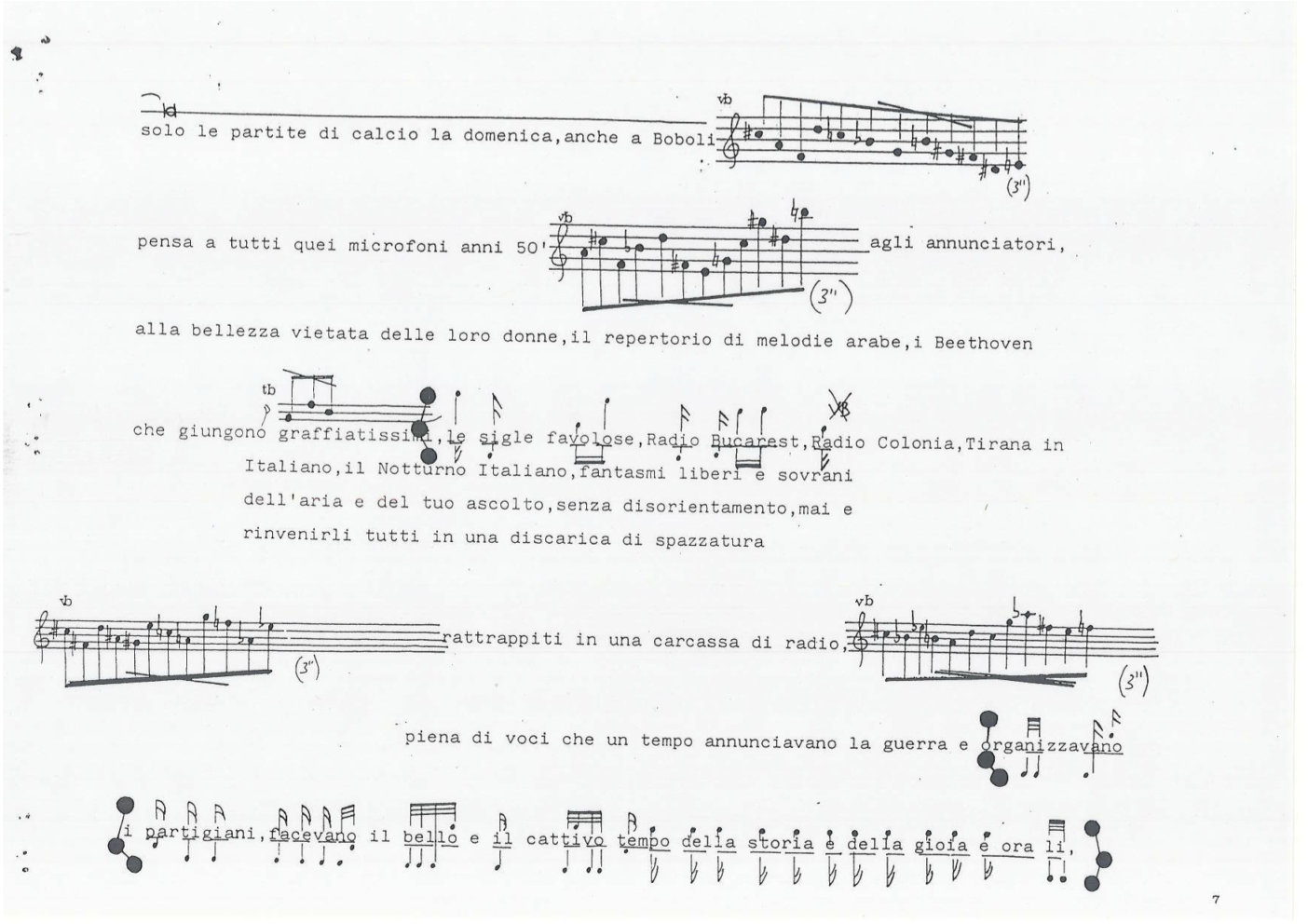
Pensa a tutti quei microfoni anni ’50 agli annunciatori, alla bellezza vietata delle loro donne, il repertorio di melodie arabe, i Beethoven che giungono graffiati dissi, le sigle favolose, Radio Bucarest, Radio Colonia, Tirana in italiano, il Notturno Italiano, fantasmi liberi e sovrani dell’aria e del suo ascolto, senza disorientamento, mai e rinvenirli tutti in una discarica di spazzatura rattrappiti in una carcassa di radio, piena di voci che un tempo annunciavano la guerra e organizzavano i partigiani, facevano il bello e il cattivo tempo della storia e della gioia e ora lì, monumenti ridicoli simulacri del nulla, monumenti ridicoli ridotti al silenzio che avevano osato riempire con tanta ostentazione.
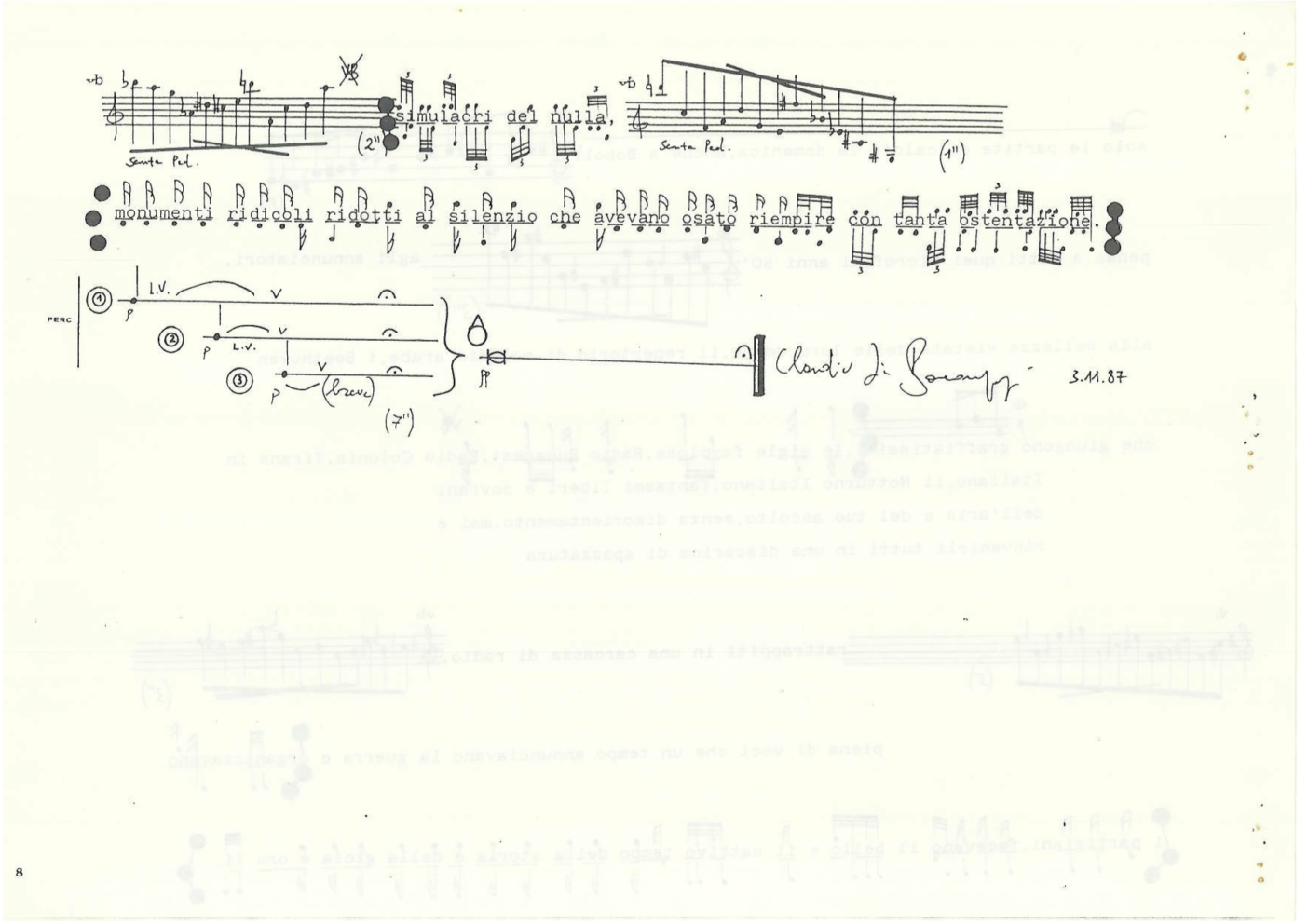
ENGLISH VERSION
Radio Garden is a fascinating journey through all the radios in the world. Click on the globe and listen to the radio of that remote location.
My gift for the fall trip is to download the free Radio Garden app, or save the site and then move me freely on the world that appears to you, and that is teeming with green dots, each of which is a radio station.
Stop wherever you like, in Barrow, on the north coast of Alaska, to listen to the KBRW broadcaster, or Radio Mugello in Borgo San Lorenzo. In Trieste, you can choose from nine local stations, in Kabul only Radio Ariana, but there is more music beyond the Khyber, in Peshawar, on AM 1170. You can search and favorite radios broadcasting only jazz or progressive rock or dedicated to Bach alone (one in Romania, another in the USA). From Greenland to Touba in Mali, there is no corner of the world that escapes the journey of radios with Radio Garden. This Netherlands Institute for Sound and Vision developed project, is nothing but the reincarnation of the old devices once well centrally placed in homes, mysterious objects that captured voices from everywhere.
Radio as a journey, radio as a company. And just Radio Compagnia is a text that I found among my sheets, that I did write and that was performed in a performance by Jonathan Faralli, a teacher at the School of Fiesole and former member of the legendary Percustra (Percussions de Strasbourg), for percussion, magnetic tape and recorded voice, to music by Claudio Josè Boncompagni.
Radio as a journey, radio as a company. And “Radio Compagnia” is a text that I found among my sheets, played as a performance for percussion, magnetic tape, and recorded voice, on music by Claudio Boncompagni. It was transmitted, ça va sans dire, on the radio, as a breviary of suggestions, of “still paths”, of thoughts in no particular order provoked by this fulfillment of life that is radio.
The undecipherable buzz from afar; foreign states overlap names with European and non-European capitals. Announcers that you don’t understand, never guess the meaning of the world, something powerful arrives, in the air, ether, atmosphere, in the open skies in night it travels like this, without the need for light or perhaps the starting point is an illuminated hemisphere; maybe it’s all condensed into the old yellowed plastic of the radio. Condensed with thickeners and bulb valves with the words closed like a jar like Swiss condensed milk, even foreign milk. This is another universe: they talk, and then the songs. Just turn the button – maneuver the knob, pilot of a ship – a half turn or a quarter depends on where you hold it, very little but carefully so as not to lose listening to what is in between, and you change the buzz.
Frequency disruption, but it’s not painful. Another voice and the distance repeats itself. Still languages with other syntactic structures. Canan’s dad – that’s what he says, you call him babbo – holds a bulky device, puts on his headset and finds China in English from Istanbul. He is an enthusiast, you’re just an improviser. You also remember a guy who worked with you on free radio, he explained a story of postcards to send if you listened to a certain station and they send you another postcard.
Here just turn on, the radio sends music, waltzes, classical, corrupt folklore, company, with strange, mysterious words, political propaganda posters, and even broadcasts in your language become foreign, you immediately imagine the foreigners who listen to it and not they understand and listening to their stations they project themselves into other foreigners who do not understand theirs. But it is the company for everyone, it is not cloying, with or without certification; just turn it on and when it goes out it’s nothing but sounds that are dead, with their ephemeral, bodily matter, stuff in short, but what worlds they were, they were before, it worked and how much you miss. Something dies and you wouldn’t know whether to believe that those sounds fly even without you, your radio; or if the radio belongs to the sounds? In the end, they are the ones who give it life, they who propose themselves; you could get rid of the beige plastic if there were no sounds if they decided not to appear on your radio, indeed their branch in your room (in your room), they decide everything for them what to say, yet you can choose a bit; or switch off. This behind their long banana microphones of corroded black granite especially those of Eastern Europe or Radio Algiers and the BBC, right?
Maybe you get confused, he is Bulgarian or not, he is Czech and instead you are wrong. But you can tell Dutch from Danish. Written yes, but on the radio, it is something else. English is simple, you think, but what about American language? Distinguish the Turkish too, you think you could do it. Although never listened to the radio yet, and then there is not the whole world. But it is the impression that it is, the strong impression that it really is, with interrupted flights on its circularity. Like tongues, who knows if it will always be night there? Maybe yes, maybe not, but if in the countryside, after your window it is night, you figure it everywhere. There is proof. The sounds come only at night, at night with the light you hear little, more hums than anything else, fewer voices, less company, indeed it is no less but it is different – with obvious music, no longer strange – more snappy, now stupid.
And the Italian stations during the day do not come to take them for foreigners. You can perhaps draw some consequences on the strangeness effect unknown per day. If you have doubts, do not ask, there is no need either: neither did I, we talked a lot, they talk (they talk) (they talk) maybe they are repeated with music, songs. The crime of throwing away an old radio, the horror of finding a route among the garbage. Plastic boxes, old-fashioned design, very different from the haunting black rectangles that only take football matches on Sundays, even in Boboli. Think of all those 50s microphones to the announcers, the forbidden beauty of their women, the repertoire of Arabic melodies, the Beethovens that arrive scratched I said, the fabulous theme songs, Radio Bucharest, Radio Cologne, Tirana in Italian, the Italian Night, free ghosts and sovereigns of the air and its listening, without disorientation, never and find them all in a garbage dump shrunk in a carcass of radio, full of voices that once announced war and organized partisans, made good and bad weather of history and joy and now there, ridiculous monuments simulacra of nothingness, ridiculous monuments reduced to silence that they had dared to fill with so much ostentation.
